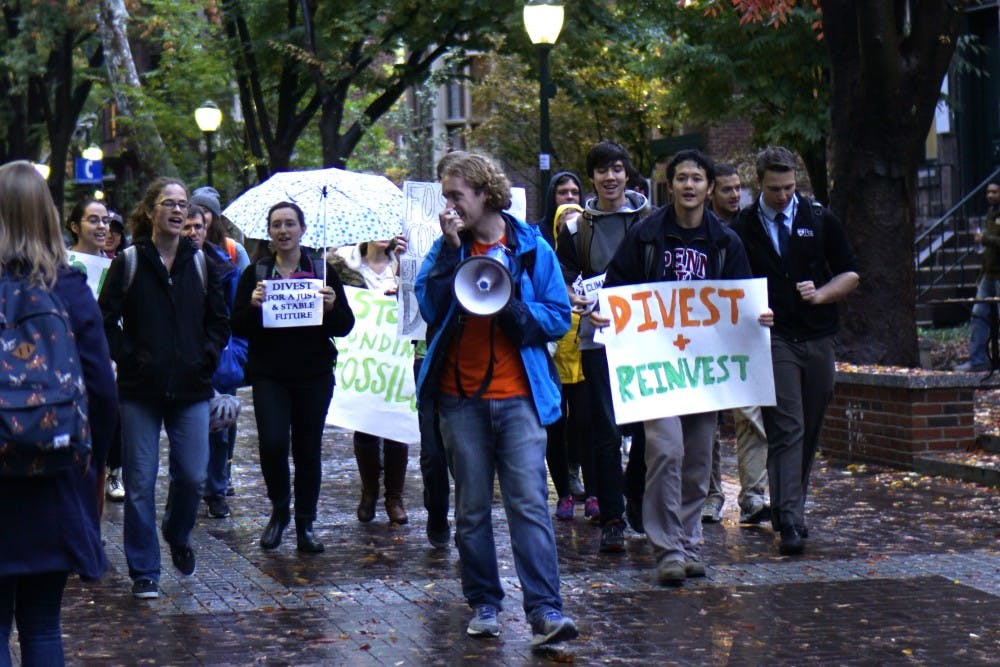
Penn students marched to Houston Hall on Oct. 28 to urge the University to divest from fossil fuel usage.
Credit: Garett NelsonAfter an overwhelmingly successful referendum, Fossil Free Penn is taking its next steps toward fossil fuel divestment.
On Oct. 28, a rally organized by Fossil Free Penn aimed to draw the University Council’s attention to a forthcoming proposal for Penn to divest from fossil fuels. The proposal follows a referendum held last winter, which past with 87.8 approval from the 33 percent of students that responded. Set to be submitted by Friday, Oct. 30, Fossil Free Penn’s proposal calls for divestment from fossil fuels, as well as the reinvestment of some of the endowment into alternative energy.
During the rally, a group of students stood just outside of a University Council meeting, forming a quiet arc near the doors of Bodek Lounge. “Stop funding fossils,” read one hand-painted sign. “Divest + reinvest” another. Other phrases were printed on sheets of paper, wilted by rain during the march to Houston Hall.
The event started on Locust Walk, just outside of the ARCH building, where members of the group gave speeches on the subject of fossil fuels, the environment and the responsibility of Penn to change its ways. The first speaker was College senior Jorge Mancilla, who delivered an impassioned speech through a megaphone to the rest of the Fossil Free group, as well as a handful of bemused onlookers.
Mancilla described an earthquake in his home city of Monterrey, Mexico, as “a herald of what we can expect in the future,” thanks largely to fracking taking place nearby. “Not even the earth’s crust,” Mancilla said, “is strong enough anymore to withstand the effects of fossil fuel extraction.” He concluded by assuring his listeners that Fossil Free Penn wouldn’t back down “until [they're] sure Penn stands on the right side of history.” The small crowd in front of him snapped appreciatively.
College junior Peter Thacher, Fossil Free Penn’s chair, went next. Speaking less intensely through the same megaphone, Thacher referenced Penn’s divestment from various companies in the past for reasons related to apartheid in South Africa and the genocide in Darfur, Sudan. He described Penn’s involvement with fossil fuels as a “moral evil,” citing the negative effects of fracking and the dangers of climate change as major reasons why the divestment is necessary. “We do not need to do these things to people and the planet,” Thacher said.
A few minutes later, the group set off toward Houston Hall. “Divest! Divest! Put fossil fuels to rest!” the demonstrators chanted, about 20 strong. Upon entering the building, the students lined the walls just outside the University Council meeting, careful not to block the exits at an administrator’s behest. Then, they waited.
After some 15 minutes, University Council members began to trickle out of their meeting, and half an hour later they were gone. They didn’t ask demonstrators what their cause was or why they wanted the attention of the Council. Nevertheless, Thacher considered it a success. “We held ourselves in a determined but respectful way,” he said.
Thomas Lee, a Wharton and Engineering junior and one of the authors of the proposal, said that submitting the proposal is far from the end of the matter. The proposal has to go through the University Council Steering Committee, who will decide whether or not it meets the criteria for consideration. From there, it goes up the ladder and can eventually find its way, if approved at every step, to the Board of Trustees. Only if accepted at that stage will the proposal take effect.
An easy criticism of the proposal is how much it’s asking of the University. Thacher acknowledges the ambition of the proposal but insists that divestment in fossil fuels won’t have a negative impact on Penn. “A number of studies have shown that fossil fuel-free portfolios perform no worse, and sometimes better, than those including fossil fuels,” he said.
Devan Spear, a College junior and a demonstrator in the rally, didn’t see the sizeable demands as a shortcoming of the proposal. “It’s important to ask for a lot when negotiating with a powerful institution like Penn,” she said. “There’s no reason to compromise on justice.”
The Daily Pennsylvanian is an independent, student-run newspaper. Please consider making a donation to support the coverage that shapes the University. Your generosity ensures a future of strong journalism at Penn.
DonatePlease note All comments are eligible for publication in The Daily Pennsylvanian.




